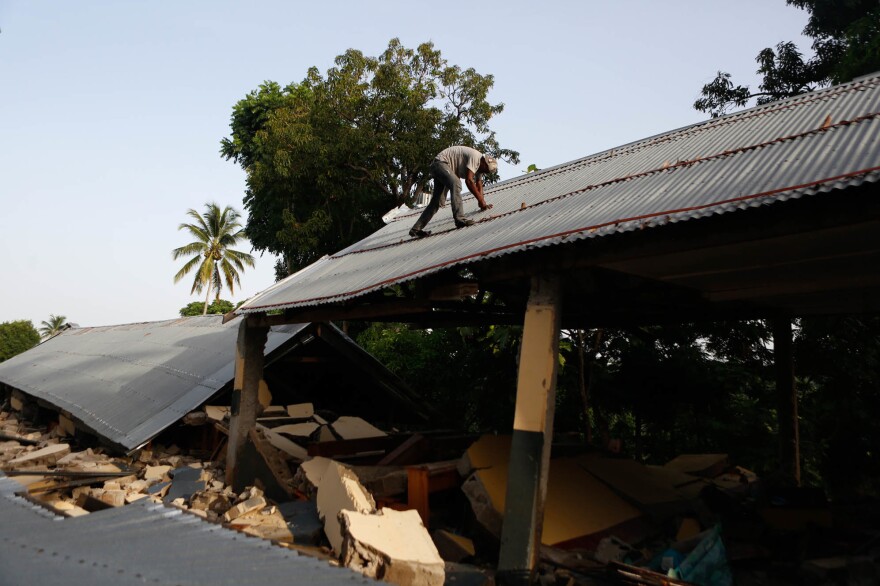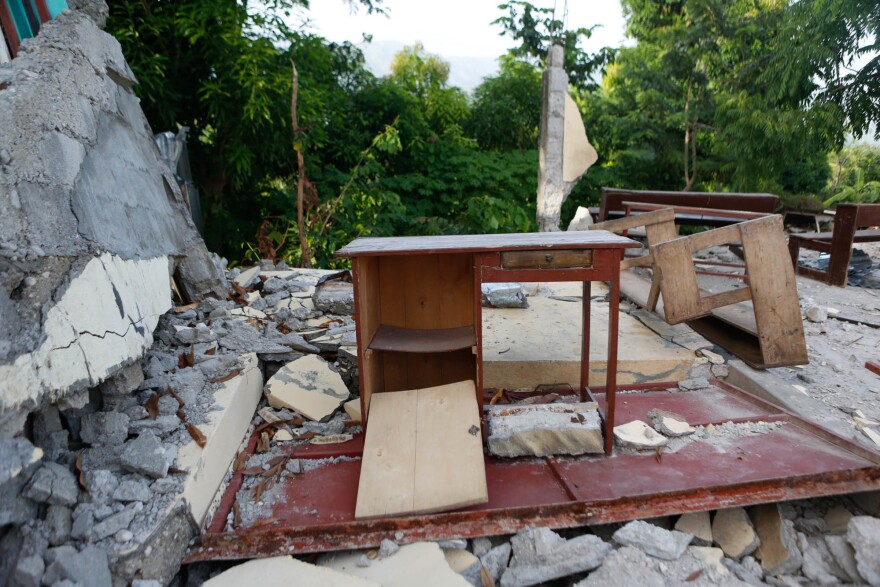MARCELINE, Haiti – Authorities in Haiti have postponed the start of school across the country after last month's 7.2 magnitude earthquake destroyed schools and homes across Haiti's southern peninsula.
It is the latest unwanted disruption to education in Haiti, where instruction has been interrupted repeatedly over the last two years due both to COVID-19 and the gang violence and kidnappings that have terrorized much of the country.
In the areas affected by the earthquake, school will begin Oct. 4. In other parts of the country, the opening will be delayed by two weeks. The school year was originally scheduled to start Sept. 6.
"For the schools to open, we have a lot of work to do. We have to remove the rubble and build structures to accommodate the children," Haiti's interim prime minister Dr. Ariel Henry said in an announcement Thursday. "Whether they are in [public] schools, religious schools or private schools, all students in the South must go to school."
The quake destroyed 173 schools and severely damaged more than 270 others, according to preliminary data from the country's education department, provided to NPR by a former education minister.
Even for those buildings that survived the quake, many families facing their own devastation at home are unlikely to have money to pay for school. At least 80% of Haiti's schools are private.
In the small town of Marceline, the school at the Mission Evangélique Baptiste du Sud d'Haiti Picot, a local church, would normally see more than 430 students each weekday, from toddlers to teenagers.
"There's no way we can start on time," said the Rev. Calixte Dorval. "We're going to need to set up temporary shelters. We need plywood. We're going to need nails. We're going to need roofing."
The preschool was beyond repair; the church has already cleared most of the rubble. In its place remain only a small pile of wreckage, broken chairs and stuffed animals.
Nearby, the walls of the primary school building buckled completely, bringing the intact sheet metal roof – which itself had been newly reconstructed after being blown off by Hurricane Matthew in 2016 – crashing down onto the desks below.
The repairs and reconstruction needed will take months if not years. In the meantime, Dorval said, the school will put up temporary shelters to be able to bring students back sooner.
"We're praying to God to be able to return to normal activities in October," he said. "We are trying to save the school year, as much as such a thing is possible."
Because the earthquake struck on a summer Saturday, classrooms were largely empty. Education officials, school staff and families alike believe the death toll of 2,200 could have been significantly higher had the tectonic plates shifted on a September weekday instead.
"Thank God it wasn't a school day, because if it had been a school day, we could say that the majority of us would have [died]," said Glasise Louis, 28, a teacher at the Centre Éducatif de la Jeunesse du Monde in Les Cayes, which was destroyed.
"We don't know what's going to happen because we're supported by Hope for Haiti," she said, referring to the international aid group that helps fund the school. "They haven't told us anything yet. We don't know what to expect."
Reached for comment, a spokesperson for Hope for Haiti said the group was still in the process of assessing damage and estimating funding needs for its 24 partner schools in the earthquake zone, a process they expected to complete over the weekend.
Even with the month-long postponement, the challenges facing schools and parents are significant. The federal government in Haiti struggles to provide public schooling even in the best of times, and education funding has declined in recent years.
Because only about 20% of schools in the country are publicly run, many parents must pay to send their children to private schools, which are primarily supported by churches and international organizations.
But even minimal tuition is a big expense in a country where many people live on $1 or $2 per day; tuition can take as much as 40% of a family's income at the best of times.

The earthquake destroyed 50,000 homes and damaged 77,000 more, according to Haitian officials, leaving many poor families an agonizing decision to make: should they use their meager resources to send their children to school, or rebuild their home?
"[From] the academic point of view, we have to open the schools," said Nesmy Manigat, who served as the country's minister of education from 2014 to 2016. "But practically — in terms of social justice, in terms of inequality — if you open the schools, [only] very privileged, rich people in Port-au-Prince and Cap-Haïtien will be able to go to school."
Longer-term recovery is also likely to be unequal, Manigat said.
Public schools will get the most help from the federal government, while private schools that are affiliated with relatively well-resourced international organizations — like foreign universities or the Catholic Church — will also have access to help.
Less certain is the future of private schools without such foreign support, which are often in isolated, rural areas.
Manigat hopes that schools in Haiti can be improved to the point where earthquakes and hurricanes don't disrupt classes for months at a time. That will require better education funding and training more teachers, he said.
"I think the Haitian elite have to... show more leadership when it comes to better funding the schools," he said. "Leaving 80% of the funding of schools in the hands of poor parents is irresponsible."
Copyright 2021 NPR. To see more, visit https://www.npr.org.



